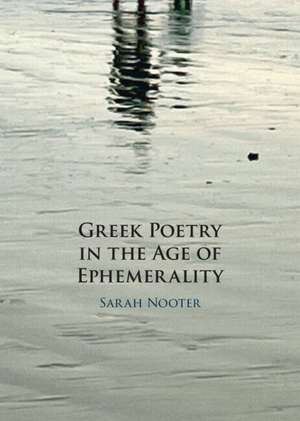Greek Poetry in the Age of Ephemerality
Autor Sarah Nooteren Limba Engleză Hardback – 26 apr 2023
Preț: 623.29 lei
Preț vechi: 700.33 lei
-11% Nou
Puncte Express: 935
Preț estimativ în valută:
119.30€ • 124.34$ • 99.31£
119.30€ • 124.34$ • 99.31£
Carte tipărită la comandă
Livrare economică 07-21 ianuarie 25
Preluare comenzi: 021 569.72.76
Specificații
ISBN-13: 9781009320351
ISBN-10: 1009320351
Pagini: 228
Dimensiuni: 252 x 175 x 19 mm
Greutate: 0.61 kg
Editura: Cambridge University Press
Colecția Cambridge University Press
Locul publicării:Cambridge, United Kingdom
ISBN-10: 1009320351
Pagini: 228
Dimensiuni: 252 x 175 x 19 mm
Greutate: 0.61 kg
Editura: Cambridge University Press
Colecția Cambridge University Press
Locul publicării:Cambridge, United Kingdom
Cuprins
1. Did the heart beat? Rhythm and the body in ancient Greek poetry; 2. The substance of song: music in Homer and the Homeric Hymns; 3. The erotics of again: time and touch in Sappho; 4. Situating Simonides: stones, song, and sound; 5. Writing the future: Pindar, Aeschylus, and the tablet of the mind; 6. Recovering the bodies of Archilochus' Cologne Epode and Timotheus' Persae.
Recenzii
'Greek Poetry in the Age of Ephemerality offers a bold reassessment of archaic and classical Greek poetry. Sarah Nooter explores temporality as a key aspect of song that allows her to bring together various strands - notably, embodiment, performance, and textual transmission. Her use of new materialism, phenomenology, sound studies, and approaches to affects is sophisticated and yields many original interpretations of poems by Archilochus, Sappho, and other authors. Well argued and engagingly written, Nooter's book is a pleasure to read.' Jonas Grethlein, Professor of Classics, Universität Heidelberg
'Sarah Nooter's new book, Greek Poetry in the Age of Ephemerality, is a fascinating exploration of time and the body in ancient poetry and poetics from Homer to Aeschylus. The place where these elements intersect is in song, music, rhythm, and the voice, which present the most ephemeral features of poetry and yet are the source of its most lasting effects. The book is an invitation to recover a richly embodied experience that is not ours, from works that we still treat as timeless today. Such is the paradoxical challenge of this highly readable study, which is certain to make a contribution to the material turn in Classics.' James I. Porter, Distinguished Professor of Rhetoric and Classics, University of California, Berkeley
'I loved this book. Written with style and wit, Nooter's Greek Poetry in The Age of Ephemerality breathes new life into archaic Greek lyric. Avoiding reductive binaries and clichéd notions of ephemerality and permanence, Nooter reanimates both ancient and contemporary ideas about poetry and poetic immortality. Attuned to extraordinary affect as well as to life's more ordinary rhythms and temporalities, her readings show us how the body itself endures, whether in mummified form, as a chorus of dancers, or as the movement, rhythm, and sound that both originate from and return us to poet and performer.' Melissa Mueller, Professor of Classics, University of Massachusetts Amherst
'Sarah Nooter's new book, Greek Poetry in the Age of Ephemerality, is a fascinating exploration of time and the body in ancient poetry and poetics from Homer to Aeschylus. The place where these elements intersect is in song, music, rhythm, and the voice, which present the most ephemeral features of poetry and yet are the source of its most lasting effects. The book is an invitation to recover a richly embodied experience that is not ours, from works that we still treat as timeless today. Such is the paradoxical challenge of this highly readable study, which is certain to make a contribution to the material turn in Classics.' James I. Porter, Distinguished Professor of Rhetoric and Classics, University of California, Berkeley
'I loved this book. Written with style and wit, Nooter's Greek Poetry in The Age of Ephemerality breathes new life into archaic Greek lyric. Avoiding reductive binaries and clichéd notions of ephemerality and permanence, Nooter reanimates both ancient and contemporary ideas about poetry and poetic immortality. Attuned to extraordinary affect as well as to life's more ordinary rhythms and temporalities, her readings show us how the body itself endures, whether in mummified form, as a chorus of dancers, or as the movement, rhythm, and sound that both originate from and return us to poet and performer.' Melissa Mueller, Professor of Classics, University of Massachusetts Amherst
Notă biografică
Descriere
Argues that the ephemeral appears in enduring forms through the body and inscribed texts in Greek poetry.
